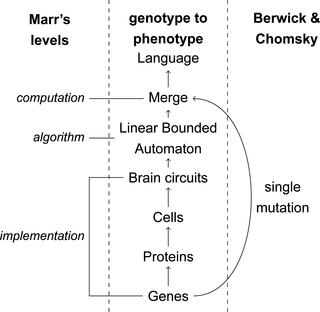当前位置:
X-MOL 学术
›
PLOS Biol.
›
论文详情
Our official English website, www.x-mol.net, welcomes your feedback! (Note: you will need to create a separate account there.)
Language evolution and complexity considerations: The no half-Merge fallacy.
PLOS Biology ( IF 9.8 ) Pub Date : 2019-11-27 , DOI: 10.1371/journal.pbio.3000389 Pedro Tiago Martins 1, 2 , Cedric Boeckx 1, 2, 3
PLOS Biology ( IF 9.8 ) Pub Date : 2019-11-27 , DOI: 10.1371/journal.pbio.3000389 Pedro Tiago Martins 1, 2 , Cedric Boeckx 1, 2, 3
Affiliation

|
Recently, prominent theoretical linguists have argued for an explicit scenario for the evolution of the human language capacity on the basis of its computational properties. Concretely, the simplicity of a minimalist formulation of the operation Merge, which allows humans to recursively compute hierarchical relations in language, has been used to promote a sudden-emergence, single-mutation scenario. In support of this view, Merge is said to be either fully present or fully absent: one cannot have half-Merge. On this basis, it is inferred that the emergence of our fully fledged language capacity had to be sudden. Thus, proponents of this view draw a parallelism between the formal complexity of the operation at the computational level and the number of evolutionary steps it must imply. Here, we examine this argument in detail and show that the jump from the atomicity of Merge to a single-mutation scenario is not valid and therefore cannot be used as justification for a theory of language evolution along those lines.
中文翻译:

语言演变和复杂性考虑:不能混为一谈。
最近,著名的理论语言学家基于人类的计算能力,为人类语言能力的发展提出了明确的设想。具体而言,已简化了“合并”操作的最低限度表述的简单性,它使人类能够递归地计算语言的层次关系,已被用于促进突然出现的单突变场景。为了支持这种观点,据说合并完全存在或完全不存在:不能有一半合并。在此基础上,可以推断出我们完全成熟的语言能力必须突然出现。因此,这种观点的拥护者在计算层面上的运算形式复杂度与它所隐含的进化步骤数量之间得出了一种平行性。这里,
更新日期:2019-12-03
中文翻译:

语言演变和复杂性考虑:不能混为一谈。
最近,著名的理论语言学家基于人类的计算能力,为人类语言能力的发展提出了明确的设想。具体而言,已简化了“合并”操作的最低限度表述的简单性,它使人类能够递归地计算语言的层次关系,已被用于促进突然出现的单突变场景。为了支持这种观点,据说合并完全存在或完全不存在:不能有一半合并。在此基础上,可以推断出我们完全成熟的语言能力必须突然出现。因此,这种观点的拥护者在计算层面上的运算形式复杂度与它所隐含的进化步骤数量之间得出了一种平行性。这里,



























 京公网安备 11010802027423号
京公网安备 11010802027423号